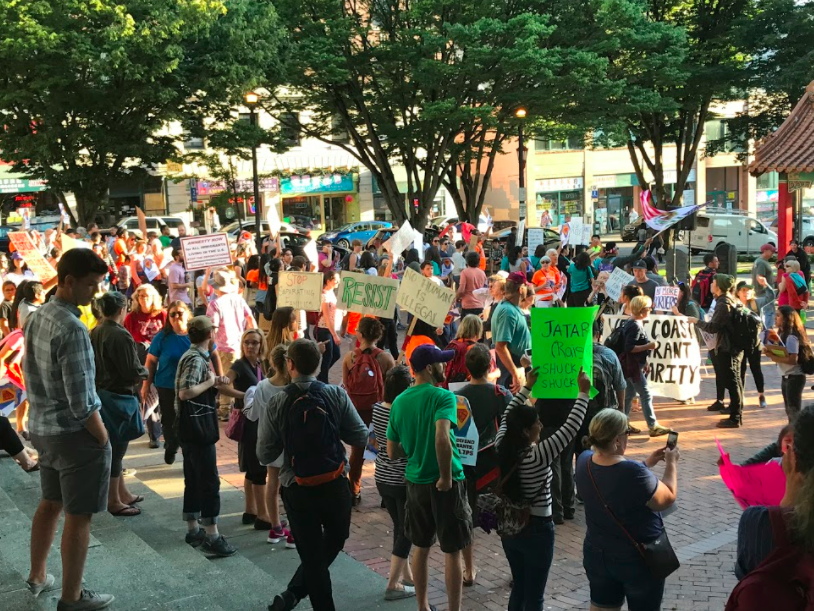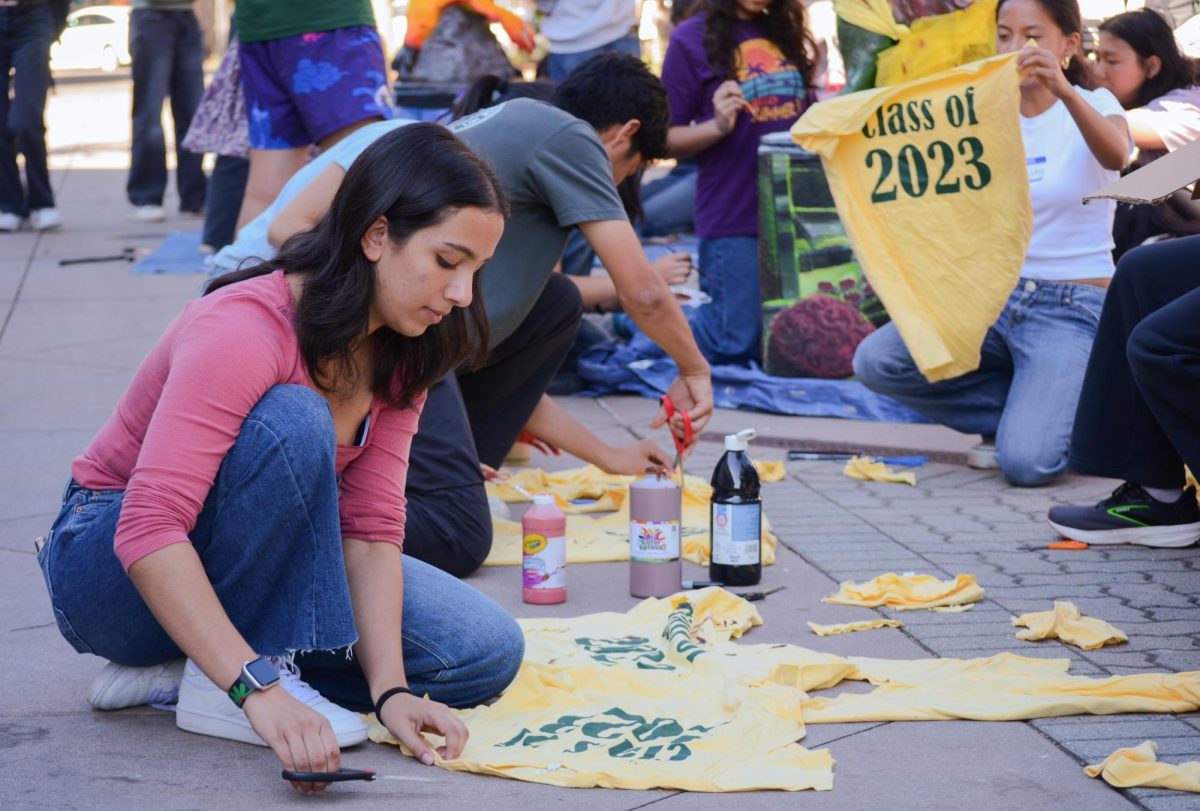Trump threatens DACA, 800,000 undocumented immigrants at risk
Protesters gather in Seattle’s Hing Hay Park to protest in favor of keeping the DACA program and protecting illegal immigrants from deportation. Texas Attorney General Ken Paxton, along with attorney generals and a governor from nine other states, gave President Trump an ultimatum to terminate the DACA program, an initiative which protects illegal immigrants who came to the United States when they were 16 or younger from deportation, before Sept. 5.
September 14, 2017
President Donald Trump ordered an end to the Deferred Action for Childhood Arrivals (DACA) program, a policy that protects approximately 800,000 young immigrants from deportation.
The announcement was made by President Trump and Attorney General Jeff Sessions at the Justice Department last Tuesday.
Trump tentatively plans to leave DACA intact for six months in order to give Congress time to come to a legislative consensus. On Sept. 5, he released a tweet announcing his intention to revisit the administrative decision after the six-month period if Congress fails to find a policy solution.
Established by the Obama administration, DACA allows undocumented immigrants who entered the United States as minors to stay in the country. While the policy does not grant permanent legal status, it offers childhood arrivals access to a variety of renewable rights, such as work eligibility and deferred action from deportation.
“Overall, I would say that [ending DACA] is not a really good move on [Trump’s] part, and I think it negatively affects the good of society in our country,” Brian Park (11) said.
Although the DACA act only extends these rights to a portion of the undocumented immigrant population, over 800,000 estimated childhood arrivals–recognized as DREAMERS–have been able to legally acquire work permits and other documents under the program’s protection since its implementation in 2012. Once the program ends in six months, the DREAMERS’ protection from deportation will expire, preventing them from being able to apply for permanent residence and to re-obtain authorization to enter the workforce.
“They’re fleeing from conditions and they’re willing to come here and work hard and do right by this country in exchange for an opportunity,” Juan Escalante, digital campaigns manager of activist think tank America’s Voice and Venezuelan immigrant, said. “[DACA] has benefited countless people across the country.”
Many DREAMERS are currently college students, with DACA’s protection permitting them to enroll in universities and obtain various forms of higher education and, later on, employment. On Sept. 8, the University of California filed a lawsuit against the Trump administration over its rescindment of the DACA program.
“As a result of the Defendants’ actions, the Dreamers face expulsion from the only country that they call home, based on nothing more than unreasoned executive whim,” the suit states. “The University faces the loss of vital members of its community… It is hard to imagine a decision less reasoned, more damaging, or undertaken with less care.”
Since the executive branch released its decision, demonstrations have broken out across the country, with protesters urging the Trump administration to keep the DACA act in place. In addition, numerous high-profile politicians, business executives and activists have expressed their opinions on Trump’s decision.
“This is a sad day for our country,” Mark Zuckerberg, the Chief Executive Officer of Facebook, wrote on his Facebook page. “It is particularly cruel to offer young people the American dream, encourage them to come out of the shadows and trust our government, and then punish them for it.”


















![“[Building nerf blasters] became this outlet of creativity for me that hasn't been matched by anything else. The process [of] making a build complete to your desire is such a painstakingly difficult process, but I've had to learn from [the skills needed from] soldering to proper painting. There's so many different options for everything, if you think about it, it exists. The best part is [that] if it doesn't exist, you can build it yourself," Ishaan Parate said.](https://harkeraquila.com/wp-content/uploads/2022/08/DSC_8149-900x604.jpg)




![“When I came into high school, I was ready to be a follower. But DECA was a game changer for me. It helped me overcome my fear of public speaking, and it's played such a major role in who I've become today. To be able to successfully lead a chapter of 150 students, an officer team and be one of the upperclassmen I once really admired is something I'm [really] proud of,” Anvitha Tummala ('21) said.](https://harkeraquila.com/wp-content/uploads/2021/07/Screen-Shot-2021-07-25-at-9.50.05-AM-900x594.png)







![“I think getting up in the morning and having a sense of purpose [is exciting]. I think without a certain amount of drive, life is kind of obsolete and mundane, and I think having that every single day is what makes each day unique and kind of makes life exciting,” Neymika Jain (12) said.](https://harkeraquila.com/wp-content/uploads/2017/06/Screen-Shot-2017-06-03-at-4.54.16-PM.png)








![“My slogan is ‘slow feet, don’t eat, and I’m hungry.’ You need to run fast to get where you are–you aren't going to get those championships if you aren't fast,” Angel Cervantes (12) said. “I want to do well in school on my tests and in track and win championships for my team. I live by that, [and] I can do that anywhere: in the classroom or on the field.”](https://harkeraquila.com/wp-content/uploads/2018/06/DSC5146-900x601.jpg)
![“[Volleyball has] taught me how to fall correctly, and another thing it taught is that you don’t have to be the best at something to be good at it. If you just hit the ball in a smart way, then it still scores points and you’re good at it. You could be a background player and still make a much bigger impact on the team than you would think,” Anya Gert (’20) said.](https://harkeraquila.com/wp-content/uploads/2020/06/AnnaGert_JinTuan_HoHPhotoEdited-600x900.jpeg)

![“I'm not nearly there yet, but [my confidence has] definitely been getting better since I was pretty shy and timid coming into Harker my freshman year. I know that there's a lot of people that are really confident in what they do, and I really admire them. Everyone's so driven and that has really pushed me to kind of try to find my own place in high school and be more confident,” Alyssa Huang (’20) said.](https://harkeraquila.com/wp-content/uploads/2020/06/AlyssaHuang_EmilyChen_HoHPhoto-900x749.jpeg)









